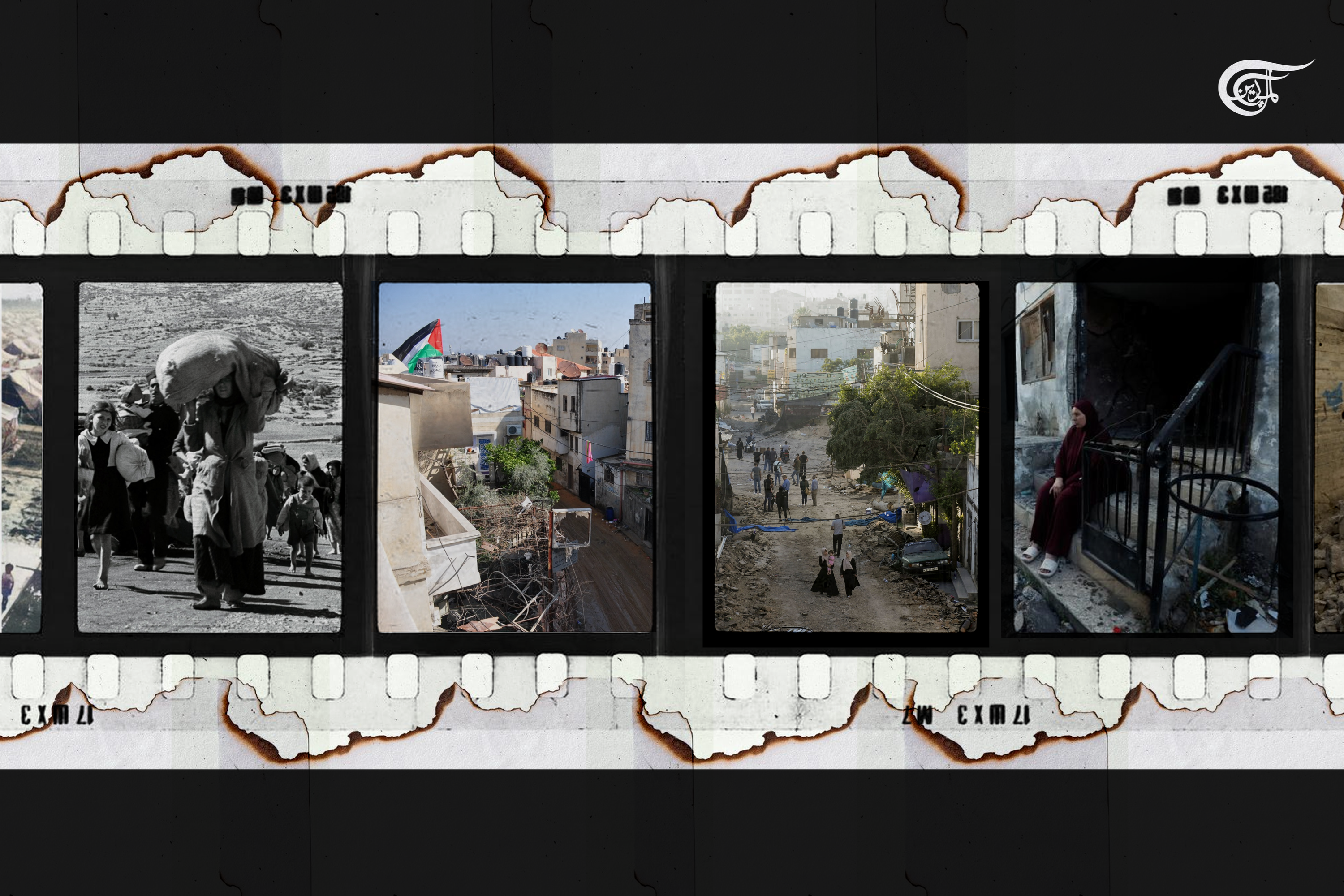Camp Jenin: The Story of Palestine
For over seventy years, "Israel" has blamed the victims, and its hasbara arm in the West has misused “antisemitism" to intimidate and silence those who dare to criticize "Israel".
-

The resemblance between refugee camps is so striking, as if designed by the same evil architect
There is a clear relationship between the recent Israeli incursion into the Jenin camp and the laws of cause and effect. Understanding the catalyst that led to the establishment of the refugee camp is therefore crucial in comprehending both the Israeli war on the camp this month, and its destruction in 2002. All this can be summarized in a short sentence: Jenin camp is as old as "Israel".
In 1948, "Israel" was founded on the ruins of over 535 Palestinian villages and towns, and the ethnic cleansing of approximately 800,000 native Palestinians expelled from their homes. Jenin camp emerged as a home for some of those who were forced to vacate their towns and villages.
In 1950, the United Nations established the United Nations Relief and Work Agency for Palestine Refugees (UNRWA) to administer 58 refugee camps, including 27 located in the West Bank, Gaza, and the Eastern part of al-Quds.
These refugee camps housed nearly one-third of all registered 1948 Palestine refugees. They provided shelter for the most vulnerable and destitute, the bottom of the bottom class. As I write, I’m not presenting an analysis, but I draw from personal life experience, having grown up in one of these camps. I have written extensively on this subject, including books on the life and formation of these camps. In my first book, "Children of Catastrophe", in the script below, I explain how these camps were established:
“The development of the camp skipped all the normal historical evolution of townships. Members of the new community came from all sorts of backgrounds and localities. Landowners, farmers, city dwellers, Bedouins, doyens, family chiefs (mukhtars), professionals, rich and poor all found themselves living and sharing a new communal life. A nomadic Bedouin was living next to a city dweller, a landowner was residing next to a farm laborer and mukhtars competed for power and authority. Local neighborhoods immediately became prototypes of old villages as the camp was informally divided by refugees based on the origin of their hometowns in Palestine. Societal class, rank and structure disappeared overnight in the catastrophe of dispossession and Nakba (catastrophe).”
I have visited camps in Lebanon, Syria, the West Bank/al-Quds, and Gaza. Every time I entered a camp, it evoked a sense of home and belonging. Narrow alleys, roofs made of corrugated asbestos or tin sheets, skip over open ditches, painting of martyrs, revolutionary graffiti or names of Palestinian villages etched on walls, wrinkled elderly faces grooved with pain, shoeless children playing with makeshift stick guns. The pleasant aroma from roasted oregano mix splattered on baked bread or manakeesh. The smell of fresh coffee wafts through an open window, occasionally overshadowing the stench from an open drain.
The resemblance between camps is so striking, as if designed by the same evil architect. Reflecting upon it now, I recognize the parallels with other oppressed communities. It is akin to the shared features one would find when visiting a Native reservation in a remote part of North Dakota or New Mexico. The profound similitude one observes when walking through the remnants of an African American plantation in Mississippi or Louisiana, or a Jewish concentration camp in Poland or Germany. The inhumane edifices in all these locations seem to be the product of a sinister blueprint intended to dehumanize people and justify cruelty.
In preparing its blueprint, Zionist terror organizations established a "Transfer Committee" to oversee the execution of their design. Whether consciously or unconsciously, the Transfer Committee assigned military operations Hebrew names that essentially amounted to ethnic cleansing, such as metatieh (sweeper), tihoor (cleansing), and neekoy (cleaning).
In 1948, following the implementation of the Transfer Committee's blueprint, a document from the Israeli Foreign Ministry's government archives revealed its outlook regarding the fate of the expelled Palestinians. It stated:
"The most adaptable and best survivors would 'manage' by a process of natural selection, and others will waste away. Some will die, but most will turn into human debris and social outcasts and probably join the poorest classes in the Arab countries."
Jenin Camp stands as an example of how Palestinian refugees defied the Israeli assessment.
Before the camp fell under Israeli occupation in 1967, a group of elders would gather each morning under a large tree atop a nearby hill. They would reminisce about their lost properties in Palestine and gaze at the valley to the west watching their inaccessible farms and homes below. They lamented as they witnessed the passing of harvest seasons, with strangers cultivating their land and entering their old homes from a short distance.
Following the occupation of Jenin, some of the same elders would sneak back and straggle along their farms, breathing in the fragrance of orange blossoms from the trees they planted, or checking on the olive season in their old groves. Some even took on farm laborer jobs just to be inside their own farms. Few women worked as cleaning ladies, serving the illegal occupiers, only for the opportunity to enter their old homes, once again.
Throughout all of this, "Israel" has never acknowledged its responsibility for creating Palestine refugee problem. On April 12, 1958, Abba Eban, then Israeli UN permanent representative and a South African native, described the situation of the expelled refugees as "temporary suffering" in an interview with Mike Wallace. He went on to blame Arabs, saying they had the "full capacity to solve" the problem.
It is worth noting that Eban used the term "temporary" ten years after "Israel" expelled the Palestinians from their homes. One can only imagine the outcry if a German government official were to describe the torment suffered by Jews during the Holocaust as "temporary suffering" and then shift the blame onto European governments for not doing enough to "solve" it.
Even if we were to accept Eban's argument that Arab governments failed to solve the "temporary suffering" of Palestinian refugees, nine years after his interview, "Israel" occupied the West Bank, Gaza, and the 27 refugee camps. As the new occupying power, "Israel" had many opportunities and complete administrative power to alleviate the "temporary suffering" in the refugee camps. To paraphrase Eban's quote, "Israel" had the capacity to demonstrate to the world, including Arab governments, how to end the suffering.
Yet, here we are, five decades after "Israel" became the sole power in the West Bank and Gaza refugee camps, what has "Israel" done to improve life in the camps?
Palestinian refugees became a new source of cheap labor to be exploited by Israeli companies. In addition to physically destroying their villages and denying them the right to return to their homes, "Israel" lobbied various U.S. administrations for over 40 years to make it more difficult for the refugees by defunding and dismantling the United Nations Relief and Works Agency for Palestine Refugees (UNRWA), which provided essential services for refugees' livelihoods. The agency offered jobs, education opportunities for refugee children, healthcare services, rations, and sanitation, among other services.
"Israel" succeeded in 2018 when Donald Trump cut U.S. support to UNRWA. Bankrupting the UN agency was "Israel's" final attempt to realize its Foreign Ministry's 1948 assessment and turn the expelled Palestinians into "social outcasts. "
Without UNRWA's funding, millions of Palestinian refugee children would not have had access to vaccinations against communicable diseases such as cholera, hepatitis, the flu (including COVID-19), tuberculosis, polio, and many others. Refugee camps, among the most densely populated areas on our planet, suffer from water scarcity and inadequate sanitation, making them perfect breeding grounds for contagious viruses. Jenin Camp, with its population of approximately 15,000 residing in a 0.16 square mile area, exemplifies this issue. I grew up in a camp with a very comparable density.
Without UNRWA's funds, thousands of Palestinian refugee children would have been denied the opportunity to attend school. Personally, I would not have been able to become a professional engineer or a writer. Most importantly, I would not have had the chance to share my experiences growing up in a refugee camp.
But perhaps that was precisely what "Israel" had desired all along—to see Palestinians "waste away."
For over seventy years, "Israel" has blamed the victims, and its hasbara arm in the West has misused “antisemitism" to intimidate and silence those who dare to criticize "Israel". It perpetuated the suffering of refugees and continued to pressure U.S. administrations to realize its prediction of turning Palestinians "into human debris," and to bury their story in eternal oblivion.
To "Israel's" frustrations, the perseverance of the refugees in Jenin and all Palestinian refugee camps remains a testament to the failed 1948 Israeli assessment of the Palestinian people. Their resilience, resistance and unwavering determination to return to their original homes stand as an indelible witness to their seven-decade-long struggle.

 Jamal Kanj
Jamal Kanj
 9 Min Read
9 Min Read











